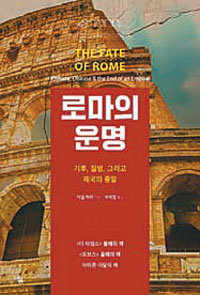How did climate change and viruses topple Rome?
How did climate change and viruses topple Rome?
Posted July. 24, 2021 07:17,
Updated July. 24, 2021 07:17

There were many books on the causes of the collapse of the Roman Empire. From its financial crisis from excessive territory expansion to the fall of spiritual civilization, many analyses were proposed. Most of them have the common perspective of the excessive greed of humans and the collapse of the political, economic, and social systems accordingly. The new book, however, points to the force of nature, such as climate change, viruses, and volcanoes. Such “destined” tragedies beyond human control came over to Rome. It especially garners attention as the entire world has been struggling with COVID-19 for two years.
The author who majored in ancient history analyzes 2,000 years of Roman history based on data across climatology, archeology, anthropology, and biology to deal with the massive topic of Rome’s decline. It is similar to the “Big History” perspective adopted by historians Yuval Noah Harari and Jared Diamond.
What’s interesting about the books is that while the author used advanced technologies as tools for analysis his conclusion is similar to Romans’ worldview, which was far from science. As Roman poet Virgil described a hero thrown into a violent storm in “Aeneid,” Romans believed that Fortuna, the goddess of fortune and the personification of luck, decided the destiny of a country. It was perhaps impossible to explain the sudden drop of Rome’s population from 700,000 in A.D. 400 to 20,000 decades later only with changes in human systems.
In fact, infectious diseases raged in Rome with an unstable climate soon after its golden age from A.D. 150 to A.D. 450. In addition, cold weather had continued from A.D. 530 to A.D. 540 during the Late Antique Little Ice Age caused by immense volcanic eruptions, having a big impact on the empire. The active movement of people, which was prompted by the expansion of the empire, made the situation even worse. According to records and research, an infectious disease suspected to be smallpox killed about seven million Romans in A.D. 165. The writer symbolically reveals the book’s main topic at the end of the preface. “The most noteworthy civilization in history had a futile dream of controlling nature.”
Sang-Un Kim sukim@donga.com







